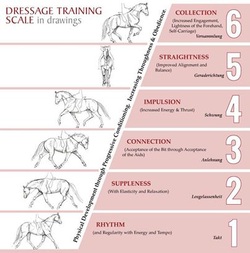I’ve seen posts about horses going from hunters to dressage but I haven’t come across much going the opposite direction.
The horse will be 11-12 yo and is basically maxing out in dressage. It can jump and has shown low level eventing. Is it realistic to think about moving over to hunters?
The main reason would be to join a club equestrian team in college. Hunters is much more common at the colleges the rider is interested in than dressage. The rider has done IEA hunters but this horse has never done hunters.
thanks


 ). I got her when she was 12. A broodmare and precious dressage horse. I was the first one to jump her over a real course. She was a wonderful horse, for many reasons. But it certainly wouldn’t be unheard of!
). I got her when she was 12. A broodmare and precious dressage horse. I was the first one to jump her over a real course. She was a wonderful horse, for many reasons. But it certainly wouldn’t be unheard of!